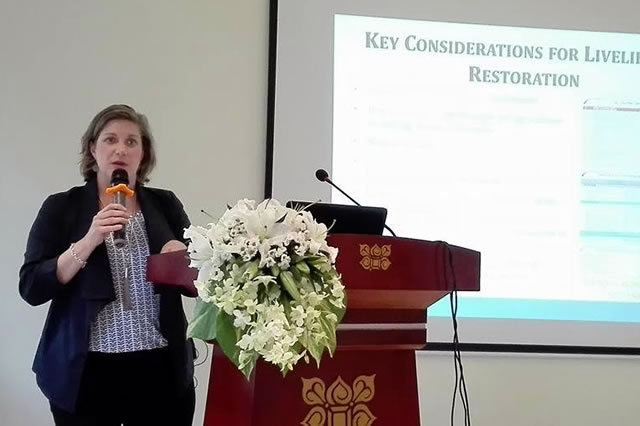Resettlement is Easier with a Consistent and Transparent Set of Rules

Myanmar Centre for Responsible Business (MCRB), together with the Thilawa SEZ Management Committee (TSMC) and JICA Expert Team held a seminar for the Yangon Regional Government staff on ‘Good Practice Approaches to Land Acquisition and Resettlement Peri-Urban and Urban Environments’ at the Rose Garden Hotel in Yangon on 5 December 2016. The seminar was attended by more than 80 participants from the government, civil society, and subject-matter specialists.
The purpose of the seminar was to share international good practices in land acquisition, resettlement and livelihood restoration applicable to Yangon and the broader Myanmar context. It provided an opportunity for participants to raise questions about key challenges currently faced in Myanmar, particularly on relocation and income restoration. Participants were presented with actual case studies on different resettlement scenarios and compensation structures in urban/peri-urban environments.
The workshop was addressed by Dr. Shwe Hein, Secretary of Thilawa SEZ Management Committee, who expressed the importance for Myanmar to exercise “effective and appropriate infrastructure development approaches to land acquisition and resettlement (LAR) practices for its development projects”
Vicky Bowman, Director of MCRB, highlighted the gaps between Myanmar law and international standards concerning resettlement and the importance of the government and project proponents to use established international frameworks such as the ‘IFC Performance Standard on Social & Environmental Sustainability, Performance Standard 5: Land Acquisition and Involuntary Resettlement’ [draft Burmese translation available here].
International resettlement and livelihood specialist, Angela Reeman presented her findings, working as an advisor to the JICA Expert Team on Thilawa SEZ, the IFC, and other organisations in Myanmar. Ms. Reeman highlighted several key takeaways on good practices for resettlement:
-
Engage in iterative, on-going meetings with the communities to keep affected people fully informed of their rights and responsibilities
-
Develop a grievance mechanism that is responsive and resolves complaints
-
Livelihood restoration plans should focus on ‘land for land’, ‘home for home’, and income restoration. Cash-based compensation and overcompensation can often be harmful for these communities
-
Land acquisition planning will take years. The planning and implementation process should be reviewed by external parties to ensure relevant standards are met
Several participants were also polled on the ‘Biggest Problem Related to Resettlement in Myanmar’ and the results are as followed:
-
Lack of government capacity to implement Myanmar law/international standards (18 votes, 46%)
-
Unrealistic claims for compensation (6 votes, 15%)
-
Squatters (5 votes, 13%)
-
Land speculation by outsiders (5 votes, 13%)
-
International NGOs (5 votes, 13%)
The following materials from the seminar are available in the sidebar: agenda of the seminar, presentations from TSMC and MCRB, presentation on Land Acquisition & Resettlement, and case study from the JICA Expert Team.
Furthermore, MCRB previously chaired a Multi-stakeholder Advisory Group on Thilawa to promote dialogue between stakeholders concerning Thilawa SEZ and in particular resettlement issues.
For additional details on the Thilawa Resettlement/Income Restoration Program, please visit: www.irpthilawa.com/node/204.
Read also
- Business Consultation on National Land Law Reform
- MCRB Expresses Concern About the Impact on Responsible Investment of the Amendments to the Virgin, Vacant and Fallow Lands Law
- MCRB submits comments to Parliament on the draft Land Acquisition Act
- Voluntary Guidelines on the Responsible Governance of Tenure (VGGT) of Land, Fisheries and Forests
- Consultation to update MCRB’s Land Rights and Business in Myanmar Briefing Paper
 English
English မြန်မာ
မြန်မာ မြန်မာ (unicode)
မြန်မာ (unicode)








